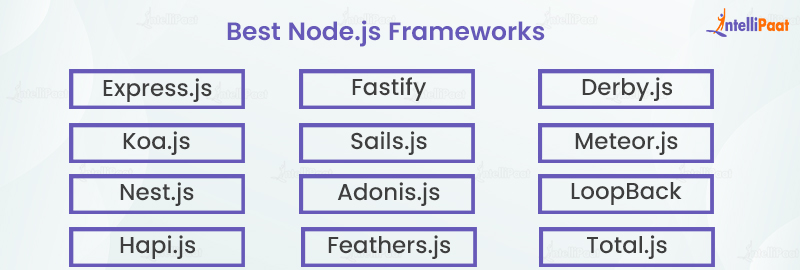12 Best Node.js Frameworks to Use in 2023
In the dynamic realm of web development, Node.js has emerged as a popular choice for building efficient and high-performing applications. With its event-driven, non-blocking I/O model, Node.js enables developers to create scalable and responsive web solutions. However, leveraging Node.js’s full potential requires the assistance of frameworks that streamline the development process. In this blog, we delve into the realm of Node.js frameworks, highlighting the 12 best options that are more commonly used in 2023.
Table of Contents
- Is Node.js a Framework?
- Benefits of Using Node.js Frameworks
- Factors to Consider When Choosing a Node.js Framework
- Best Node.js Frameworks
- Conclusion
What if you could learn all about NodeJS in a single place? Check out this video then:
{
“@context”: “https://schema.org”,
“@type”: “VideoObject”,
“name”: “Node JS Course | Node JS Tutorial | Intellipaat”,
“description”: “12 Best Node.js Frameworks to Use in 2023”,
“thumbnailUrl”: “https://img.youtube.com/vi/KE_wDYp-Xu8/hqdefault.jpg”,
“uploadDate”: “2023-07-21T08:00:00+08:00”,
“publisher”: {
“@type”: “Organization”,
“name”: “Intellipaat Software Solutions Pvt Ltd”,
“logo”: {
“@type”: “ImageObject”,
“url”: “https://intellipaat.com/blog/wp-content/themes/intellipaat-blog-new/images/logo.png”,
“width”: 124,
“height”: 43
}
},
“embedUrl”: “https://www.youtube.com/embed/KE_wDYp-Xu8”
}
Is Node.js a Framework?
Node.js is not classified as a framework. It functions as an open-source JavaScript runtime that utilizes Chrome’s V8 JavaScript engine. By utilizing Node.js, developers can execute JavaScript code outside of a web browser, enabling server-side scripting and the creation of scalable network applications. Although Node.js includes a wide range of libraries and modules that help in the development of server-side applications, it does not constitute a comprehensive framework in and of itself.
On the other hand, frameworks serve the purpose of constructing functionalities. Numerous developers have crafted frameworks specifically for Node.js, such as Express.js, Meteor.js, and other tools, aiming to provide distinctive capabilities and convenience for software engineers working on Node.js applications.
Benefits of Using Node.js Frameworks
When it comes to develop web applications, harnessing the power of Node.js frameworks can be beneficial for developers. We will discuss the several benefits of using Node.js frameworks below:
- Increased Efficiency: Node.js frameworks, such as Express.js and Koa, offer a streamlined development experience with built-in features and modules. They provide a solid foundation for building web applications, reducing the time and effort required to code repetitive tasks.
- Scalability: These frameworks excel at handling concurrent connections, making them ideal for building scalable applications. Their event-driven architecture allows efficient handling of multiple requests, ensuring optimal performance even under heavy loads.
- Real-Time Applications: Node.js frameworks are well-suited for real-time applications like chat platforms and collaborative tools. With features like WebSockets and event-driven programming, developers can create responsive and interactive applications that update in real-time.
- Large Ecosystem: Node.js frameworks benefit from a vast ecosystem of packages available through npm. These packages provide ready-made solutions for common functionalities, saving developers from reinventing the wheel and enabling rapid development.
- Cross-Platform Compatibility: These frameworks are cross-platform, meaning they can be deployed on various operating systems. This versatility allows developers to write code once and run it seamlessly on different platforms, reducing development and maintenance efforts.
- Single Programming Language: One significant advantage of Node.js frameworks is the ability to use JavaScript both on the front-end and back-end. This enables developers to work with a single language throughout the entire stack, improving productivity and reducing the learning curve. The seamless integration between the client and server sides allows for efficient communication and data synchronization, making development more streamlined.
- Microservices Architecture: Node.js frameworks are well-suited for implementing a microservices architecture, a modular approach to building applications. With Node.js frameworks like Nest.js and Seneca, developers can easily break down complex applications into smaller, independent services. This approach brings benefits like scalability, flexibility, and easier maintenance, as each service can be developed, deployed, and scaled independently, promoting a more agile and modular development process.
Sign up for a Node.js Certification Course right away!
Factors to Consider When Choosing a Node.js Framework
When selecting a Node.js framework for your project, there are several important factors to consider. By evaluating these factors, you can make a decision that aligns with your project requirements and ensures a smooth development process. Below are the key considerations:
- Performance and Scalability: Assess the framework’s performance capabilities and scalability features. Look for benchmarks and performance tests to evaluate how efficiently it handles high traffic and concurrent requests.
- Community and Support: Consider the size and activity of the framework’s community. A vibrant community ensures ongoing support, regular updates, and a vast pool of resources, such as tutorials, forums, and plugins, that can assist in your development journey.
- Documentation: Comprehensive and well-maintained documentation is crucial for developers, particularly beginners. Good documentation provides clear examples, detailed explanations, and guides, making it easier to learn and work with the framework.
- Ease of Use: Evaluate the framework’s learning curve and the ease of getting started. A beginner-friendly framework can save time and effort in the initial stages of development, allowing developers to grasp its concepts and build applications efficiently.
- Modularity: Look for a framework that supports a modular architecture, allowing you to organize your code into reusable and maintainable components. Modularity promotes code cleanliness, enhances reusability, and simplifies future updates or modifications.
- Security: Security is a critical aspect of any application. Assess the framework’s security features, such as protection against common web vulnerabilities, secure session management, and encryption options. Additionally, check if the framework has a proactive security team that promptly addresses vulnerabilities.
- Database Support: Consider the framework’s compatibility with different databases. Verify if it supports your preferred database system or the one most suitable for your project, such as MongoDB, MySQL, PostgreSQL, or others.
- Integration and Compatibility: Determine if the framework integrates well with other tools and libraries commonly used in your development stack. Consider its compatibility with popular modules, middleware, and third-party services that you may need to integrate into your application.
- Maturity and Stability: Evaluate the framework’s maturity and stability by considering factors such as its release history, versioning, and the number of active installations. A stable and mature framework is less likely to introduce breaking changes and provides a more reliable foundation for your project.
- Industry Adoption: Assess the framework’s popularity and adoption within the industry. Widely adopted frameworks often have a larger talent pool, better community support, and a higher chance of long-term sustainability.
- Flexibility and Extensibility: Consider the framework’s flexibility and extensibility features. Determine if it allows customization, supports plugins or extensions, and enables you to tailor it to your specific project requirements.
- Testing and Debugging: Evaluate the framework’s built-in testing and debugging capabilities. A robust testing environment and debugging tools can significantly simplify the development process and help identify and fix issues more efficiently.
- Performance Monitoring and Analytics: Check if the framework provides performance monitoring and analytics features. These can assist in identifying bottlenecks, tracking performance metrics, and optimizing your application for a better user experience.
Node.js Interview Questions and Answers: A great resource for brushing up on your knowledge before upcoming interviews.
Best Node.js Frameworks

Here we will explore 12 Node.js frameworks anticipated to make a significant impact in 2023.
1. Express.js
Express.js is a minimalist and flexible web application framework that has been widely adopted by developers due to its simplicity and robustness. It provides a thin layer of features built on top of Node.js, allowing developers to create web applications quickly. Express.js supports middleware, routing, and templating, making it an ideal choice for small and large-scale applications.
When to Use Express.js:
- Use Express.js when you need to build fast and lightweight web applications.
- Choose Express.js for developing APIs and microservices with its flexible routing and middleware capabilities.
- Employ Express.js for creating back-end APIs to support single-page applications (SPAs) built with client-side frameworks like React or Angular.
- Utilize Express.js for prototyping and rapid application development (RAD) due to its simplicity and minimal setup.
- Opt for Express.js when you require customization and extensibility, leveraging its vast ecosystem of middleware and extensions.
- Consider Express.js as a great starting point for learning Node.js and web development due to its intuitive syntax and extensive documentation.
2. Koa.js
Koa.js, a next-generation framework, harnesses the power of modern JavaScript features like async/await, generators, and promises. It offers a concise and expressive syntax, surpassing Express.js in code cleanliness and maintainability. Koa.js focuses on middleware composition and boasts a lightweight core, making it ideal for high-performance applications.
When to Use Koa.js:
- Choose Koa.js when you want to build applications with a concise and expressive syntax.
- Utilize Koa.js for leveraging modern JavaScript features like async/await, generators, and promises.
- Opt for Koa.js in scenarios where middleware composition and clean code structure are crucial.
- Consider Koa.js when you need a lightweight framework with a focus on high performance.
- Employ Koa.js for handling asynchronous operations efficiently in your Node.js projects.
3. Nest.js
Nest.js, a progressive and opinionated framework, combines the strengths of Angular and Node.js. It emphasizes a modular and scalable architecture inspired by Angular’s dependency injection and decorators. Nest.js prioritizes developer productivity and maintainability, making it a suitable choice for enterprise-level applications.
When to Use Nest.js:
- Utilize Nest.js when you want to build scalable and maintainable enterprise-level applications.
- Choose Nest.js for its modular and opinionated architecture inspired by Angular.
- Opt for Nest.js when you need dependency injection and decorators for better code organization and testability.
- Consider Nest.js when productivity and code maintainability are crucial factors in your project.
- Employ Nest.js for building server-side applications that require a structured and robust framework.
4. Hapi.js
Hapi.js is a comprehensive framework created for the purpose of constructing resilient and expandable server-side applications. It presents a plugin system that streamlines the process of enhancing its capabilities. Hapi.js includes built-in provisions for authentication, caching, and input validation, rendering it a superb option for the development of APIs and microservices.
When to Use Hapi.js:
- Opt for Hapi.js when you need to build robust and scalable server-side applications.
- Utilize Hapi.js for its extensive plugin system that simplifies extending functionality.
- Select Hapi.js when built-in support for authentication, caching, and input validation is essential.
- Consider Hapi.js for API and microservice development as it emphasizes on performance and security.
- Pick Hapi.js when you require a framework that excels in handling complex routing and request-handling tasks.
Unlock the Power of Node.js – Check out our Node.js Tutorial today!
5. Fastify
Fastify is a high-performance framework specifically built for the efficient handling of HTTP requests. It focuses on speed and minimal overhead while providing a developer-friendly and extensible API. By leveraging the latest Node.js features, such as async/await, Fastify maximizes throughput and minimizes response times.
When to Use Fastify:
- Pick Fastify when you prioritize high performance and minimal overhead in your Node.js applications.
- Consider Fastify for its developer-friendly and extensible API, leveraging modern JavaScript features like async/await.
- Opt for Fastify when you need to maximize throughput and minimize response times.
- Select Fastify for building efficient APIs and microservices that require speedy request handling.
- Implement Fastify when you want to leverage the latest features of Node.js for optimal performance and scalability.
6. Sails.js
Sails.js is a comprehensive MVC framework that streamlines the development of real-time applications. It provides a powerful ORM (Object-Relational Mapping) and supports the automatic generation of APIs and WebSockets. Built on top of Express.js, Sails.js allows developers to get familiar with Express.js and quickly get started.
When to Use Sails.js:
- Select Sails.js when you want to develop real-time applications with a comprehensive MVC framework.
- Consider Sails.js for its powerful ORM (Object-Relational Mapping) capabilities, simplifying database interactions.
- Opt for Sails.js when you need the automatic generation of APIs and WebSockets for seamless real-time functionality.
- Implement Sails.js if you are already familiar with Express.js, as it builds on top of it, making the learning curve smoother.
- Employ Sails.js when you require a robust framework that provides a structured approach to building real-time applications.
7. Adonis.js
Adonis.js is a robust and comprehensive framework following the MVC pattern. It includes features such as a powerful ORM, authentication and authorization mechanisms, and a convenient command-line interface. Adonis.js aims to provide a full-stack development experience similar to Laravel in the PHP world.
When to Use Adonis.js:
- Employ Adonis.js when you want to build scalable and maintainable web applications.
- Select Adonis.js for its battery-included approach, offering features like ORM, authentication, and security out of the box.
- Opt for Adonis.js when you prefer a familiar syntax similar to Laravel, making it easier for PHP developers to transition to Node.js.
- Consider Adonis.js for building full-stack applications with server-rendered views and RESTful APIs.
- Pick Adonis.js when you are looking for a framework that emphasizes convention over configuration for streamlined development.
8. Feathers.js
Feathers.js is a lightweight and flexible framework that specializes in building real-time applications and RESTful APIs. It offers a service-oriented architecture and supports various databases and protocols. Feathers.js simplifies the development process by providing a modular structure and a vast ecosystem of plugins and integrations.
When to Use Feathers.js:
- Consider Feathers.js when you need to build real-time applications and RESTful APIs with ease.
- Opt Feathers.js for its service-oriented architecture and support for various databases and protocols.
- Utilize for Feathers.js when you want a lightweight and flexible framework that simplifies development.
- Adopt Feathers.js for projects requiring instant data updates and collaboration, as it offers real-time functionality out of the box.
- Employ Feathers.js when you have a necessity for scalable and modular framework with a vast ecosystem of plugins and integrations.
9. Derby.js
Derby.js is a full-stack JavaScript framework focused on real-time collaboration and synchronization. It combines server-side rendering with client-side JavaScript to create highly interactive applications. Derby.js features automatic data synchronization and conflict resolution, making it an excellent choice for collaborative projects.
When to Use Derby.js:
- Consider Derby.js when you want to develop real-time collaborative applications.
- Utilize Derby.js for its combination of server-side rendering and client-side JavaScript for highly interactive experiences.
- Pick Derby.js when automatic data synchronization and conflict resolution are crucial for collaborative projects.
- Select Derby.js for building real-time editing tools, collaborative dashboards, and multiplayer games.
- Employ Derby.js when you are looking for a full-stack framework that excels in real-time collaboration and synchronization.
10. Meteor.js
Meteor.js is a comprehensive JavaScript framework that empowers developers to build dynamic web applications in real-time. It boasts seamless integration of both client-side and server-side code, enabling effortless data synchronization.
When to Use Meteor.js:
- Consider Meteor.js when you aim to build real-time web and mobile applications.
- Utilize Meteor.js for its full-stack capabilities, allowing you to develop both the front-end and back-end using a single language (JavaScript).
- Opt for Meteor.js when you want a framework that provides built-in features for data synchronization, hot code reloading, and real-time communication.
- Use Meteor.js for rapid application development (RAD) and prototyping due to its ease of use and quick setup.
- Select Meteor.js when you require a framework that simplifies the development of real-time collaborative applications and eliminates the need for complex integration between front-end and back-end components.
11. LoopBack
LoopBack is an exceptionally flexible and robust framework designed specifically for crafting RESTful APIs and microservices. It simplifies the development process through a visual modeling tool that facilitates the creation of data models and establishes relationships with ease. With its extensive connector support, LoopBack offers seamless integration with diverse data sources, enhancing the efficiency of API development.
When to Use LoopBack:
- Choose LoopBack when you need a powerful and extensible framework for building APIs and microservices.
- Utilize LoopBack when you need to create RESTful APIs with minimal coding effort, due to its auto-generated API explorer and built-in data modeling capabilities.
- Opt for LoopBack when you want to leverage strong integration capabilities with various databases, authentication providers, and other systems.
- Consider LoopBack for enterprise-level applications that demand scalability, security, and flexibility.
- Employ LoopBack when you are asked for a framework that simplifies the development of robust and scalable APIs while providing a rich set of features out of the box.
12. Total.js
Total.js is a robust and versatile framework that empowers developers to create scalable web applications efficiently. With its modular and extensible architecture, Total.js offers a comprehensive set of tools and features for building modern web solutions. It embraces the Model-View-Controller (MVC) pattern, providing a clear separation of concerns and enhancing code maintainability. Total.js boasts powerful functionalities like real-time communication, server-side rendering, and integrated database support. Its simplicity and intuitive syntax make it an ideal choice for both beginners and experienced developers.
When to Use Total.js:
- Pick Total.js when you want to build modern and scalable web applications.
- Utilize Total.js for its modular architecture and extensive set of reusable components.
- Choose for Total.js when you need efficient real-time communication and event-driven programming.
- Implement Total.js for projects that require high-performance and secure data handling.
- Opt for Total.js when you want a framework that emphasizes on simplicity and productivity, enabling faster development and maintenance of web applications.
Conclusion
In conclusion, Node.js has emerged as a powerful and versatile platform for building scalable and high-performance web applications. While Node.js itself is not a framework, it provides a foundation for numerous frameworks that leverage its asynchronous, event-driven nature. Utilizing Node.js frameworks offers several benefits, including increased developer productivity, faster application performance, and a vibrant ecosystem with a wealth of libraries and tools.
We pointed out the 12 Best Node.js Frameworks to use in 2023, each catering to specific needs and preferences. Choose wisely and embark on your Node.js development journey with confidence.
If you have any questions, feel free to bombard those on our Community Page!
The post 12 Best Node.js Frameworks to Use in 2023 appeared first on Intellipaat Blog.
Blog: Intellipaat - Blog
Leave a Comment
You must be logged in to post a comment.







